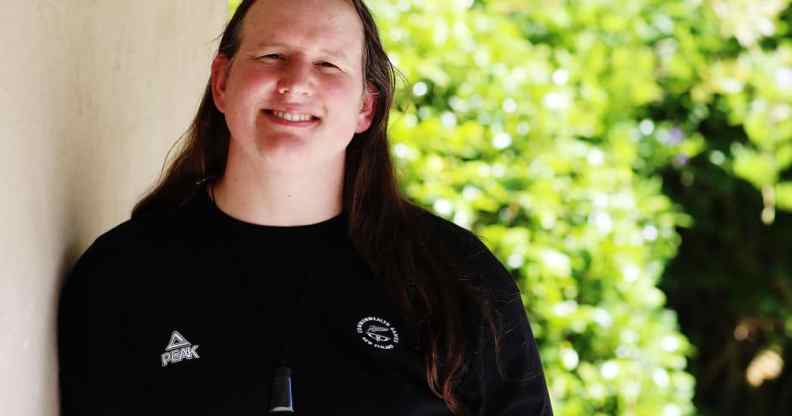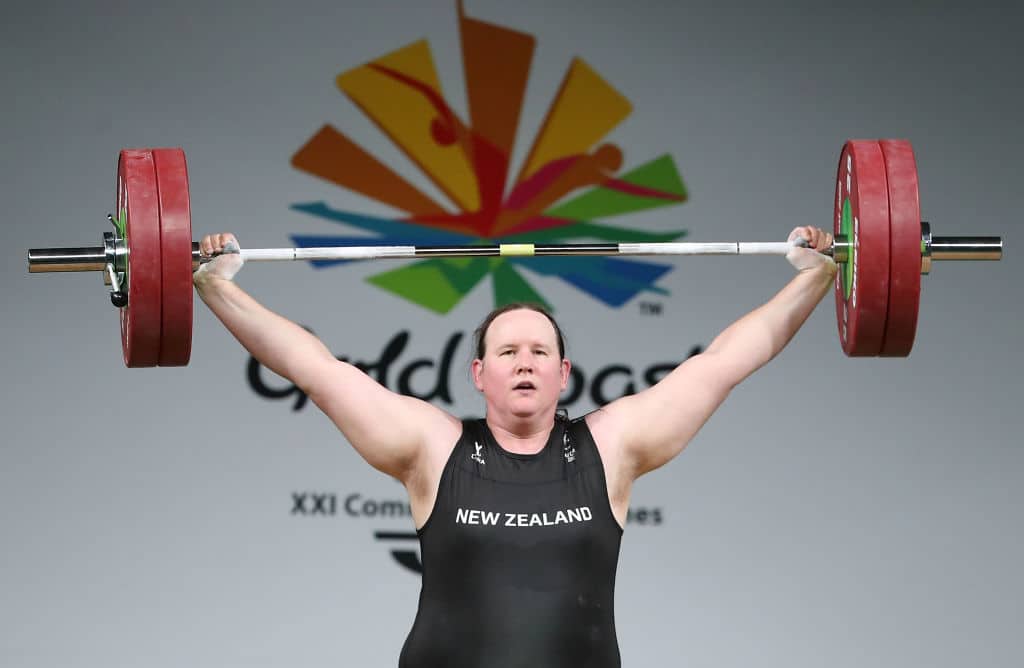Laurel Hubbard’s incredible, tumultuous journey as trans weightlifter makes Olympic history

Laurel Hubbard. (Hannah Peters/Getty)
There was widespread jubilation in the LGBT+ community in June when it was announced that weightlifter Laurel Hubbard had qualified for the Olympics in Tokyo.
The incredible moment put the New Zealand woman on track to become the first openly trans woman to compete in the Olympic Games – but it also came after years of hard work.
Laurel Hubbard did not become an Olympic athlete overnight – the 43-year-old had a long, often tumultuous journey that led to her qualifying for the Tokyo Games in June.
Hubbard’s weightlifting career started in the 1990s, prior to her transition – but it wasn’t long before she decided to call it quits. She set a junior record in 1998, but just three years later, she made the difficult decision to leave weightlifting behind.
Speaking to RNZ in 2017, Hubbard explained that she first got into weightlifting in a bid to “feel more masculine” at a time when she was struggling with her gender.
“To be honest that’s why I started doing weightlifting so many years ago, because it was archetypally male. I thought perhaps if I tried something that was so masculine, perhaps that’s what I’d become, but sadly that wasn’t the case.”
When asked why it was “sad”, Laurel Hubbard clarified: “Well, sad in the sense that it maybe would have made some of the darker periods in my life a bit more manageable.”
In that same interview, she explained that she wanted to clear up the “misconception” that she had spent her entire life prior to her transition training as a weightlifter.
“What people don’t realise is I actually stopped lifting in 2001 when I was 23 because it just became too much to bear,” Hubbard said. “Just the pressure of trying to fit into a world that perhaps wasn’t really set up for people like myself.”
Laurel Hubbard gave up weightlifting for a decade before she transitioned
In the years that followed, Hubbard drifted out of the public eye, and then, in 2012, she made the decision to live her truth. That year, she started transitioning, paving the way for her reintroduction to the sport she loved.
In 2017, Laurel Hubbard competed at the Australian International and Australian Open in Melbourne in the 90kg+ category. Remarkably, she won the gold medal, making her the first trans woman to win a weightlifting title for her home country.
Her win was applauded by many in the LGBT+ community, and Hubbard was held aloft as a powerful role model for trans and queer youth everywhere.
For so long, many LGBT+ people had felt excluded from sport due to discriminatory attitudes and a harsh climate – but Hubbard’s success seemed to suggest that change was on the way.
Sadly, her victory led to a wave of misogynistic, transphobic abuse. Fellow athletes spoke out against Hubbard, saying she shouldn’t be allowed to compete.
Speaking to RNZ in December 2017, Laurel Hubbard reflected on the transphobia she had faced as a result of her history-making win.
“People believe what they believe and when they’re shown something which is maybe new and different to what they know, it’s instinctive to be defensive,” she said.
“Look, I can’t really speak for other people and what they feel, and what they think, and what they believe, and it’s not really my job to change what they think, what they feel or what they believe, but I just hope they look at the bigger picture rather than just trusting whatever their gut might have told them.”
Speaking to Stuff.co.nz in 2017, Hubbard said: “All you can do is focus on the task at hand and if you keep doing that it will get you through.
“I’m mindful I won’t be supported by everyone but I hope that people can keep an open mind and perhaps look at my performance in a broader context.”
Laurel Hubbard’s weightlifting career almost came to an end in 2018 when she competed at the Commonwealth Games and seriously injured her elbow while attempting a 132kg snatch. Shortly afterwards, she said she was likely to retire from weightlifting altogether because of the injury, adding that her arm was “busted” due to ruptured ligaments.
“It looks like it’s probably going to be a career-ending injury, which is a real shame, but I’m glad I’ve gone out trying to achieve my best on the platform,” she said.
But Hubbard’s career had another resurgence. Just months later, she rowed back on her retirement plans following treatment, and she went on to compete at the New Zealand championships in September 2018.
Laurel Hubbard came back from serious injury to qualify for the Olympics
In 2019, Hubbard had her biggest successes to date at the Pacific Games in Apia, where she walked away with two gold medals and a silver medal. The extraordinary feat proved that she had well and truly come back from her elbow injury. Her journey to the Olympics seemed back on track.
Laurel Hubbard’s stunning career trajectory finally led to her history-making Olympics qualification in June. In a heartfelt statement, Hubbard thanked her followers for their endless support.
“I am grateful and humbled by the kindness and support that has been given to me by so many New Zealanders,” she said.
“When I broke my arm at the Commonwealth Games three years ago, I was advised that my sporting career had likely reached its end. But your support, encouragement, and your ‘aroha’ [affection] carried me through the darkness.”
Needless to say, Hubbard was immediately targeted with vitriolic transphobia, with many claiming she shouldn’t be allowed to compete despite her many achievements as a weightlifter.
Regardless of what transphobes think, Laurel Hubbard’s selection for the Olympic Games in Tokyo has proven a momentous occasion for trans and queer people across the world.
Whether she wins a medal or not at the Olympics when she competes on Monday (2 August), she will have made a mark on the global LGBT+ community.


